|
|
|
Sort Order |
|
|
|
Items / Page
|
|
|
|
|
|
|
| Srl | Item |
| 1 |
ID:
130866


|
|
|
|
|
| Publication |
2014.
|
| Summary/Abstract |
Curbing corruption is vital for China's future. But the exposure of corruption cases can only damage public confidence in the CCP and the state more generally. Corruption associated with toxic food, bogus medicines, grave abuses of power and criminal 'black societies' has produced a series of public scandals in China. Without reform, further occurrences could rapidly erode the legitimacy not just of the police and other judicial organs, but also of the ruling Chinese Communist Party (CCP). The recent trial of Bo Xilai, the former Chongqing party secretary and member of the party's elite 25-member Politburo, showcased the kind of corruption that China's past president Hu Jintao warned could lead to 'the collapse of the Party and the downfall of the state'. In 2011, the Bank of China inadvertently reported that between 1994-2008 as many as 18,000 corrupt officials had fled the country for destinations in Europe, America and other parts of Asia, plundering an estimated $120 billion from state-owned enterprises and other criminal activities. The costs of maintaining domestic public order have also grown rapidly, and, for the first time, domestic security outlays approved by the 2012 National People's Congress (NPC) exceeded defence, in part over concerns about the growth of mass protests, fraud, corruption and organised crime, and the need to strengthen weiwen (stability) and social harmony.
|
|
|
|
|
|
|
|
|
|
|
|
|
|
|
|
| 2 |
ID:
132737
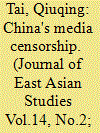

|
|
|
|
|
| Publication |
2014.
|
| Summary/Abstract |
Media censorship is the hallmark of authoritarian regimes, but much of the motivation and practices of autocratic media censorship still remain opaque to the public. Using a dataset of 1,403 secret censorship directives issued by the Chinese propaganda apparatus, I examine the censorship practices in contemporary China. My findings suggest that the Chinese Communist Party (CCP) is gradually adjusting its censorship practices from restricting unfavorable reports to a strategy of "conditional public opinion guidance." Over the years, the propaganda apparatus has banned fewer reports but guided more of them. However, this softer approach of regulating news is not equally enforced on every report or by different censorship authorities. First, the party tends to ban news that directly threatens the legitimacy of the regime. In addition, due to the speed with which news and photographs can be posted online, the authorities that regulate news on the Internet are more likely to ban unfavorable reports, compared with authorities that regulate slower-moving traditional media. Lastly, local leaders seeking promotions have more incentive to hide negative news within their jurisdictions than their central-level counterparts, who use media to identify misconduct among their local subordinates. Taken together, these characteristics create a strong but fragmented system of media regulation in contemporary China.
|
|
|
|
|
|
|
|
|
|
|
|
|
|
|
|
| 3 |
ID:
129261
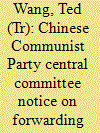

|
|
|
|
|
| Publication |
2012.
|
| Summary/Abstract |
To the Xinjiang Autonomous Region Party Committee and the party committees of all provinces, municipalities, and autonomous regions; the party committees of all large military districts, provincial military districts, and field armies; all central ministries and commissions; the party committees of various ministries and commissions of state organs; all general headquarters of military commissions; the party committees of all services of the armed forces; and the party committees of all people'sorganizations:The "Central Secretariat Summary of Discussions on Work Issues inXinjiang"1is hereby issued to you. Please implement it and carry it out in connection with actual circumstances. This document is simultaneously issued to the Party committees of all provinces, municipalities, and autonomous regions for reference. On the morning of July 6, 1981, issues in the work in Xinjiang were once again discussed in accordance with the Resolutions on a Number of Historical Questions in the Party since the Founding of the People's Republic passed by the Sixth Plenary Session of the Eleventh Party
|
|
|
|
|
|
|
|
|
|
|
|
|
|
|
|
| 4 |
ID:
130445
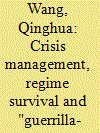

|
|
|
|
|
| Publication |
2014.
|
| Summary/Abstract |
Based on newly available memoirs and previously unexplored policy speeches by insiders, this article conducts a political analysis of the Chinese Communist Party's decision to radically expand college enrollment in June 1999. I argue that the decision exemplifies a "guerrilla-style approach" to policy-making. From late March to early June of 1999 when the radical expansion policy was formulated and legitimated, the top leadership ignored opposition from the Ministry of Education (MOE), overturned established policies and assumed de facto control over MOE bureaucratic power. This abrupt, forceful, disruptive and non-professional policy intervention, which aimed to ensure regime survival in the wake of the Asian financial crisis, was antithetical to regularized educational policy-making in post-Mao China.
|
|
|
|
|
|
|
|
|
|
|
|
|
|
|
|
| 5 |
ID:
132947
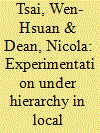

|
|
|
|
|
| Publication |
2014.
|
| Summary/Abstract |
Reforms carried out by the Chinese Communist Party (CCP) have long followed a traditional model of "experimentation under hierarchy." This article will attempt to develop this model further by building a framework to illustrate the influence of both the political dynamics of hierarchical central-local relations and local economic circumstances in the introduction of large-scale political reforms. The initiation and expansion of "experimental points" are only permitted in those select few provinces with both favourable political and economic local conditions, allowing the CCP to minimize risk and make informed decisions regarding possibilities for nationwide reform. This article proposes that the hierarchical interaction of central and local political elites, and in particular provincial secretaries, can explain the extent of reforms, whereas the type of reform is linked to distinct provincial economic conditions and the provincial secretary's interpretation of provincial priorities. Put succinctly, the CCP's model of political reform can be specifically characterized as "experimentation under hierarchy in local conditions." This article presents a detailed discussion of both the political and economic considerations inherent in this concept, and provides examples of reform programmes in Guangdong and Sichuan to illustrate the model in practice.
|
|
|
|
|
|
|
|
|
|
|
|
|
|
|
|
| 6 |
ID:
124269
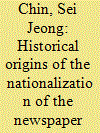

|
|
|
|
|
| Publication |
2013.
|
| Summary/Abstract |
This paper explores the reasons behind the relative success of the CCP's direct control over the news media in the early 1950s. Despite its importance in understanding the rise of depotism during the Mao era, the nationalization of the newspapers has not been fully studied. Building upon the recent studies emphasizing the adaptive nature of the CCP, this study analyzes the ownership transformation of the Shanghai newspapers from the 1930s to the early 1950s by going beyond the 1949 divide. I argue that the CCP's relative success in.
|
|
|
|
|
|
|
|
|
|
|
|
|
|
|
|
| 7 |
ID:
131637
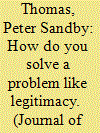

|
|
|
|
|
| Publication |
2014.
|
| Summary/Abstract |
Previously in this journal, Gunter Schubert's article, entitled 'One-party rule and the question of legitimacy in contemporary China', called for the setting up of a new research agenda to analyze the legitimacy of the Chinese Communist Party (CCP). While making a valuable contribution to the study of the CCP's legitimacy, Schubert's emphasis on the empirical measurement of this concept gives rise to a number of conceptual and theoretical issues. As a consequence, this article seeks to contribute to the research agenda by addressing these issues. In so doing, it suggests that a shift away from a narrow empirically-measured focus on legitimacy towards a broader conceptually-driven concern with legitimation would allow for a more inclusive agenda within the China studies community and lead to a more complete understanding of why the CCP remains in power.
|
|
|
|
|
|
|
|
|
|
|
|
|
|
|
|
| 8 |
ID:
132732
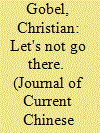

|
|
|
|
|
| Publication |
2014.
|
| Summary/Abstract |
Field research in China often requires the researcher to cooperate with two kinds of actors: research collaborators, such as those at universities or official think tanks, and local officials. These actors facilitate or enhance field access, but such access comes at the price of a potential "pre-selection bias" in data collection. Some scholars have argued that dependence on these "gatekeepers" introduces a significant bias into research outcomes. I argue, however, that the constraints faced by China scholars in their field studies are not absolute, but function by degree. The CCP is monolithic neither in its organization nor in the thoughts of its agents, and close collaboration with local partners can help remove normative bias rather than necessarily introducing it. Most importantly, an argument built exclusively on the power of structural constraints discounts China scholars' most crucial abilities: to learn, to think critically and to research holistically.
|
|
|
|
|
|
|
|
|
|
|
|
|
|
|
|
| 9 |
ID:
129262


|
|
|
|
|
| Publication |
2012.
|
| Summary/Abstract |
To the Government of the Xinjiang Autonomous Region: The Summary of Discussions on the Work of Opening Up Xinjiang has been perused and approved by Comrade Gu Mu. In line with the opinions of leading comrades, it is hereby printed and issued to you. Please study it and carry it out. Ever since the third plenary session of the eleventh party congress, Xinjiang has been politically stable and united and economic construction has developed rapidly. The industrial and agricultural gross output value of 1986 has more than doubled that of 1980. Agriculture and animal husbandry have had bumper harvests for ten consecutive years, and the region is more than self-sufficient in cereals, cotton, oil, and sugar crops. Import trade, use of foreign currency, and the tourist business have made significant progress. Airline and railway communications and transport conditions have seen constant improvement. Xinjiang has abundant resources and a vast, sparsely populated territory and has great potential for developing the economy and supporting national construction.
|
|
|
|
|
|
|
|
|
|
|
|
|
|
|
|
| 10 |
ID:
128279
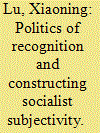

|
|
|
|
|
| Publication |
2014.
|
| Summary/Abstract |
Adopting an historical approach, this essay reexamines the national minority films produced between 1949 and 1966 in socialist China with a focus on its role in the Chinese Communist Party's political project of building an ideal socialist citizenry. Shifting the critical anchoring of the national minority film from questions of representation to those of performance and spectatorship, it points out that cross-ethnic performance embedded within film narrative and discerned by historically situated audiences simultaneously constructs and deconstructs ethnicity, thus encouraging a transformative recognition across the ethnic boundary. Ultimately the national minority film models fraternity of citizenship essential to creating socialist subjectivity.
|
|
|
|
|
|
|
|
|
|
|
|
|
|
|
|
| 11 |
ID:
130435
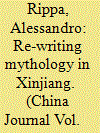

|
|
|
|
|
| Publication |
2014.
|
| Summary/Abstract |
The Chinese Communist Party has often used history as a tool to serve its political purposes. This article analyzes the ways in which mythological accounts have been manipulated in order to strengthen Beijing's control over the restive northwestern province of Xinjiang. Relying on an analysis of various materials (including museum exhibitions, textbooks and travel guides), I explore how the figures of the Queen Mother of the West and King Mu of the Zhou have been used to assert that Xinjiang has been an inalienable part of China since prehistoric times. The materials analyzed treat mythological texts as valid sources of geographical and historical data, whereas Western scholars largely agree that these cannot provide any reliable information of this kind. In accordance with the tradition of early commentators, I define this approach as euhemeristic, in that it treats mythological accounts as a reflection of historical events.
|
|
|
|
|
|
|
|
|
|
|
|
|
|
|
|
| 12 |
ID:
129446
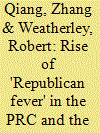

|
|
|
|
|
| Publication |
2013.
|
| Summary/Abstract |
This article examines the upsurge in Chinese public support for the legacy of the Republican era, a phenomenon known as 'Republican fever'. The fever has arisen following the formal relaxation of restrictions on discussing the Republican period. The rationale for doing so is linked to political expediency and in particular to the CCP's quest for nationalist legitimacy. By acknowledging the positive aspects of the Republican era as part of a placatory policy on reunification with Taiwan, the CCP is trying to present itself as a key partner in a united patriotic front with the Kuomintang. But things have not turned out as planned. As Republican fever has spread across a diverse section of Chinese society, so too has criticism of the CCP's record in power. In light of this, we argue that instead of fortifying the Party's nationalist legitimacy, the CCP has unwittingly started a process which appears to be eroding that legitimacy.
|
|
|
|
|
|
|
|
|
|
|
|
|
|
|
|
| 13 |
ID:
130447
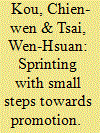

|
|
|
|
|
| Publication |
2014.
|
| Summary/Abstract |
Within the operational procedures of the Chinese Communist Party (CCP) cadre appointment system, age restrictions hinder cadre promotion. As a result, three different methods have emerged to bypass these restrictions, allowing officials to attain faster promotion. These three methods are the Communist Youth League route, temporary transferred duty and non-regulation promotion. This article will explain the age restriction system, and then outline the three methods and discuss their impact on the appointment system as a whole. The examples of Zhou Qiang and Lu Hao, rising political stars, demonstrate how these methods are used to gain substantial age advantages for successful career progression.
|
|
|
|
|
|
|
|
|
|
|
|
|
|
|
|
| 14 |
ID:
131949
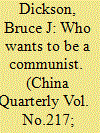

|
|
|
|
|
| Publication |
2014.
|
| Summary/Abstract |
This article analyses trends in the Chinese Communist Party's recruitment strategy and the composition of Party members. Based on original survey data, it analyses the motives for joining the CCP, the consequences on career mobility, and the effects of Party membership on political beliefs and behaviour in contemporary China. These data reveal three key findings. First, for those who aspire to positions in the Party/government bureaucracy or SOEs, Party membership is a necessary, if not sufficient, condition; for those in the non-state sector, it is youth and college education that are the keys to top jobs, and not Party membership. Second, CCP members are more likely to donate time, money, and even blood, for various causes, and to vote in local people's congress elections. This behaviour demonstrates mobilized loyalty: the CCP mobilizes its members to participate in these activities to demonstrate their loyalty to the regime and to serve as examples to the rest of the population. Third, Party members are not more likely to support and trust their state institutions: while they do have higher levels of support for the centre than the rest of population generally, Party membership does not produce increased support for the local state. Nor does economic development: all else being equal, support for central and local party-state institutions is lower in the most developed cities. These findings call into question the Party's recruitment and development policies, as well as the conventional wisdom on the link between economic development and popular support for the status quo.
|
|
|
|
|
|
|
|
|
|
|
|
|
|
|
|
|
|
|
|
|